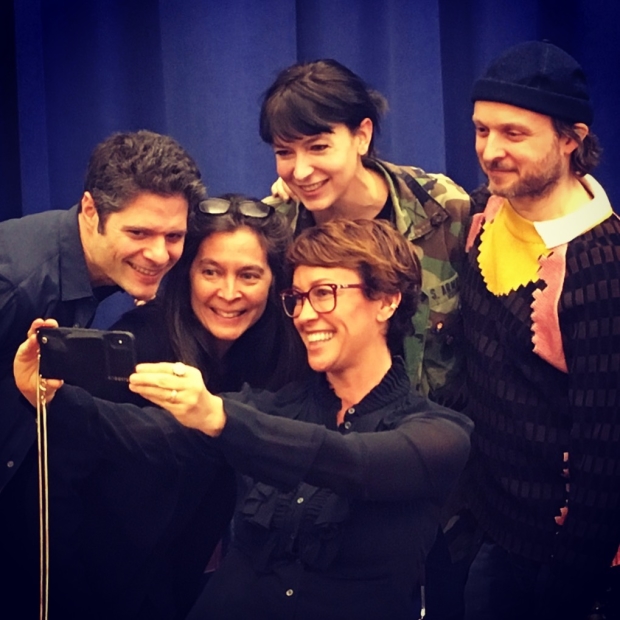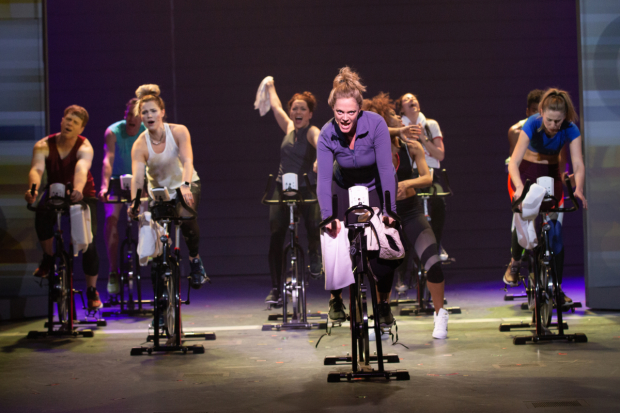Inspired by the Music of Her Past, Diablo Cody Looks to the Future With Jagged Little Pill
The Academy Award-winning writer turns Alanis Morissette’s hit ’90s album into a musical for a woke generation.

(© Courtesy of Diablo Cody)
In 2016, Diablo Cody, widely known as the screenwriter of films including Juno (for which she won an Academy Award), Young Adult, and the recently released Tully, found herself sitting in a Malibu café with musician Alanis Morissette to discuss the possibility of writing the book for a musical version of Morissette's 1995 album Jagged Little Pill, in the works for Boston's American Repertory Theater.
Cody soon committed (head over feet) to the show, and before she knew it, she was joined in a New Yok rehearsal room with a cast, Morissette, and the show's director Diane Paulus, preparing for Jagged Little Pill's May world premiere at A.R.T.
And it wasn't at all ironic.
Jagged Little Pill was the formidable album of most of our adolescences. How much influence did this record have on your life — specifically as a teenager?
I was 15 when the album came out, and I will never forget the first time I heard "You Oughta Know." It was in 1995, at the tail end of the grunge era, and there was a lot of really bad, growly c*ck rock on the radio. Alanis's bravery was so refreshing. I felt like I knew her, as a fellow repressed Catholic girl raised in a "polite" household. And what was so fascinating about the album — and I continue to marvel at this — is that even though the lead single is known for being loud and angry, there are also all these complex, spiritual, philosophical songs on Jagged Little Pill. Alanis's emotional intelligence is off the charts; she's always been so much more than the "angry girl." I could identify with the rage, but I also related to the more Zen, insightful songs as well.
How did your work on the Jagged Little Pill musical and your collaboration with Alanis Morissette transpire?
I was actually one of the last members of the creative team to join this project. When the producers and Alanis reached out to me in late 2016, the show already had its director attached — the incredible, brilliant, Tony-winning Diane Paulus — and an opening date of May 2018. They were missing just one tiny, inconsequential piece of the puzzle — a book! They had met with other writers, but nobody felt quite right. I went to meet her at a café in Malibu, and we just connected right away. Though I have to admit, once I got the job, I went into panic mode. Usually a Broadway musical takes years to write and develop, but I didn't have that luxury. I knew I had to come up with a story and a script quickly. We had our first sing-through workshop in June of 2017 in New York, and everything took off from there.
Where did the story for Jagged Little Pill come from?
I got really lucky with the source material. With some jukebox musicals, you can sense the librettist really struggling to find meaning in the band's greatest hits. Jagged Little Pill is different; it's deep and confessional and really takes you on a ride. The songs contain all these mini-narratives that are so inspiring. For instance, when I heard the song "Mary Jane," I could easily picture the subject. She was struggling and self-critical and had been denying herself for a long time. I thought to myself, "I know a lot of moms like that!" And thus the character of Mary Jane Healy, Connecticut housewife, was born. There's also this major theme on the album of waking up and facing reality, even when it's painful. So I thought to myself, "What might these people be trying to hide?" And that became a major part of the show: Do the Healys preserve their image of the perfect family, or do they expose themselves and walk into the light?
Have you always been a fan of musical theater? Any shows in particular that you drew inspiration from when writing?
I've always loved watching musicals, but this is the first time I've ever had any involvement in making one. I did think about Hair and Rent and how both shows have managed to avoid feeling dated even though they're very specific documents of their era. Ironically, that specificity is what makes them timeless. So I decided to really lean into the issues we're dealing with right this second: opiate addiction, #MeToo, race relations, conversations about gender, hypercompetitive parenting, all of it.

(© Evgenia Eliseeva)
What's one challenge you were faced with when working on this project? And was there anything that came easier than you had anticipated?
The biggest challenge was the fact that I did not clear my schedule for this project. I couldn't afford to; I make my living writing film and TV. At this same time, this show was a huge priority. I got creative whiplash. For the first time, really, I had to learn how to juggle multiple projects. I'd work on this raw, crazy musical for weeks, and then I'd have to kick out a super-sanitized comedy pilot for ABC. That was hard, switching gears like that. And I also have three kids! I brought them to New York for rehearsals, and that was hard because I'd come home exhausted and felt like such a bad mom. Then I opted to not bring them to Boston for previews and that was hard because I missed them so much! It's all hard when kids are involved.
The one thing that came easy was working with the creative team. I love all of them: Alanis, Diane, our music director Tom Kitt, and choreographer Sidi Larbi Cherkaoui (who is also Beyoncé's choreographer, just saying). We all clicked, which is rare.
Who is the target audience for Jagged Little Pill?
We've had some diverse audiences, people of all ages and backgrounds. The musical theater audience typically skews older, so I was a little nervous about how that older demographic might respond to some of this material. We don't pull any punches in this show. Much to my relief and delight, we've had a super positive response from the boomers. I guess what I'm saying is, I hope the target audience is everyone.








